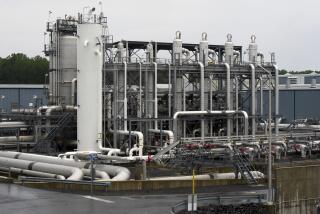U.S. Changes Rules on Natural Gas Contracts
- Share via
WASHINGTON — Federal energy regulators said Tuesday that they are going to let some contracts between natural gas producers and their pipeline customers work like almost all other contracts--when they’re over, they’re over.
It hasn’t worked that way in the past, when the rule has been: It isn’t over when it’s over.
It has been an oddity of the natural gas business that under the 1938 Natural Gas Act, contracts for the purchase of gas at the wellhead by interstate pipelines continued in force even after their terms said they expired. They remained in force until the Federal Energy Regulatory Commission gave one party or the other permission to wind up the contract and end sales or purchases.
Under a commission regulation adopted Friday and made public Tuesday, a producer has permission to wind up sales on an expired contract on 30 days’ notice.
Pipelines that have declared “open access,” pledged to transport gas for any owner, may similarly stop accepting gas on an expired contract. However, “closed” pipelines that have not made such pledges still will need the commission’s approval to stop buying gas under expired contracts.
The old policy was used to discourage producers from jumping out of the interstate market into the unregulated intrastate market, where prices might be higher. Since 1978, however, the two markets have for all practical purposes been unified.
Gas reserves dedicated to interstate pipelines have been steadily diminishing as old contracts have been abandoned under case-by-case decisions by the energy commission.
“Continuation of the dedication of the gas after expiration . . . merely places restraints on the movement of the gas, preventing it from going from one group of customers to other customers who may currently have a greater need for it,” the commission said.
It said it did not believe that there would be a major effect on prices. Gas dedicated to interstate commerce is about 60% of pipeline gas purchases, and about one-sixth of that, or 10% of purchases, is under expired contracts, the commission said.
Last year, two-thirds of the gas that pipelines carried was not purchased by the pipelines, but was carried for somebody else such as a producer or broker.
Only a few major pipelines have chosen open access. For that reason, producers who want to stop deliveries to a buying pipeline under an expired contract may have trouble getting their gas to a new buyer unless an open access pipeline serves their field.
More to Read
Sign up for Essential California
The most important California stories and recommendations in your inbox every morning.
You may occasionally receive promotional content from the Los Angeles Times.










